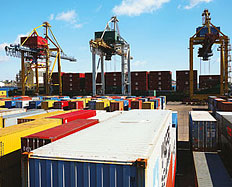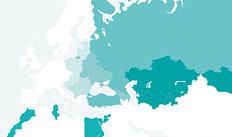COUNTRY ASSESSMENTS
Ukraine
HIGHLIGHTS OF THE PAST YEAR
- The pace of recovery from the crisis has slowed down. As the global economic environment deteriorated, growth of Ukraine’s commodity-based export sectors decelerated. Credit growth has suffered from deleveraging by European banks and tight monetary policy focused on a stable exchange rate.
- The business environment has deteriorated further, notwithstanding recent administrative reforms. Illegal corporate raids have increased. Tax administration policies - including delayed VAT refunds, limited ability of companies to deduct investments from corporate tax and advance tax payments - have deterred investors.
- The authorities made steps to reform the gas sector. A decision was made to reorganise the national oil and gas company Naftogaz along functional lines into production, transit and distribution units. Licenses to explore shale gas were auctioned to multinational companies, and discussions initiated to widen geographic sources of gas imports.
KEY PRIORITIES FOR 2013
- Improvement of the country’s difficult business environment remains a top priority. The justice system should be reformed to ensure that procedures for resolution of commercial disputes are fair, and commercial courts should be de-politicised. The government should effectively implement various measures adopted in recent years to improve governance and reduce corruption.
- The announced reforms of the gas sector should be implemented. Household gas tariffs should be adjusted towards the import parity levels and implicit energy subsidies should be monitised. Reorganisation of Naftogaz along functional lines should be completed, and individual companies’ accounts be made transparent.
- Post-crisis stabilisation in the financial sector should be completed. It will be necessary to reverse the unconventional crisis-time policies, such as local currency provisions on foreign currency loans, that exposed banks to currency movements. The National Bank and the government should pursue policies to develop capital markets in local currency.
MACROECONOMIC PERFORMANCE
The pace of economic recovery has slowed down. After expanding quickly through much of 2011, Ukraine’s output growth decelerated to 2.5 per cent in the first half of 2012 due to a substantial slow-down in the steel and chemical sectors and machine building, and stagnation of agriculture and construction. More recent data suggest that agriculture and construction have also declined. For much of the year, the contraction of external demand was offset to some extent by buoyant domestic consumption, stimulated by fast growth of public sector wages and social expenditures. The National Bank of Ukraine (NBU) and the government adopted various measures to contain depreciation pressures, which included tightening further the banks’ open currency positions, introducing additional administrative requirements on forex purchases by households, issuing domestic dollar, euro and devaluation-protected hryvnia bonds and removing export tariffs on some grains to stimulate exports. The Eurobond issue in July 2012 at a historically high interest rate, the rollover of VTB loans and new credits from China should provide temporary relief. Inflation has decreased from 11.9 per cent year-on-year in June 2011 to a record low of minus 1.2 per cent in June 2012, due to lower global food prices and tight monetary policy. Inflation increased more recently as food prices crept up again.
The economy remains vulnerable to external shocks. Although Ukraine’s exports are less energy and resource-dependent than those of neighbouring countries, the share of low value-added steel and chemicals remains very high. The stock of external private and public debt is also high, most of it with relatively short maturities and denominated in foreign currencies, and gross external financing requirements remain large. After a large devaluation in 2008, the hryvnia - de facto pegged to the US dollar since then - appreciated in real terms against currencies of its main trading partners, thus erasing most of the competitiveness gains. A further escalation of EU banking and sovereign crises may have a negative effect on the Ukrainian financial sector as it is highly exposed to the euro area.
A return to fast growth experienced before the crisis is unlikely without deep structural reforms. The financial sector is recovering from the crisis and is unlikely to stimulate demand for some time as most banks prefer reducing their balance sheets to further capital injections. The public sector’s future ability to provide a countercyclical boost will be limited by the high gross financing needs. Growth is expected to remain subdued, at around three per cent in 2012-13 as spare capacity left after the crisis is exhausted, the external environment remains difficult and bank lending is limited. Over the longer term, acceleration of growth will primarily depend on external demand, but also the authorities’ ability to credibly stabilise the financial system, pursue countercyclical macroecnomic policies based on a floating exchange rate, and attract significant domestic and foreign investment.
MAJOR STRUCTURAL REFORM DEVELOPMENTS
Progress in improving the country’s difficult business environment has been mixed. The National Anti-Corruption Committee, chaired by President Yanukovych, has focused the authorities’ attention on the country’s long-standing corruption challenge. Although the tax authorities increased the share of VAT refunds paid through the fast-track system, many international companies continue to face long delays. To boost tax revenues, tax legislation was amended in November 2011 to slow the pace of deduction of capital investments from the corporate profit tax. Companies also report frequent requests of advance tax payments by the tax authorities. The procurement legislation was amended to exempt state enterprises from public procurement rules. The increasing incidence of illegal corporate raids has had a negative effect on Ukraine’s image as a destination for foreign direct investment.
Development of the financial sector continues to suffer from the legacy of the crisis. The authorities have been working to improve regulatory frameworks for the financial sector, by developing policies to increase transparency of banks’ ownership, supervision and resolution frameworks. Although the banking system is reasonably well capitalised, following the mandatory recapitalisations of 2009-10, banks’ balance sheets are weakened by a large stock of non-performing and restructured loans, which are 9.2 per cent of the total as of July 2012. The balance sheets of many international banks have long de facto positions in hryvnias, reflecting the unconventional crisis-time policy of the National Bank to require provisioning in local currency on foreign currency loans aimed at exchange rate stability. The stock of liquidity provided to the banking system during the crisis remains high, at around five per cent of GDP, and several banks nationalised during the crisis have suffered from governance problems and are yet to be resolved. The country has become a participant in the Vienna 2 Initiative, which aims at improvement of home-host country coordination and managing the process of bank develiveraging.
A new Customs Code was implemented. The new code, which came into force on 1 June 2012, is intended to simplify import procedures, by permitting registration of imports at any customs agency, including before goods are imported, reducing the length of customs registration procedures from one day to four hours, introducing electronic declarations and implementing the single-window principle. The new rules also provide for decriminalisation of merchandise smuggling and restrict the customs service’s authority to confiscate contraband. If implemented in letter and spirit, the code should help improve Ukraine’s business environment as difficult and cumbersome procedures have complicated Ukraine’s integration into international production chains.
The authorities have continued to reform the country’s gas sector. In March 2012 the parliament approved legislation allowing the government to separate the national energy company Naftogaz into production and transportation divisions. If implemented, the reform will move Ukraine towards compliance with EU legislation, which requires the separation of energy production, transportation and sales, a commitment Ukraine made as a member of the European Energy Community. The government has been working to diversify sources of gas consumed in Ukraine. In May 2012 it auctioned licenses to explore the Olesska and Yuzivska blocks of shale gas, purchased by major international companies Chevron and Shell. Discussions on potential imports of gas from western Europe and construction of an LNG terminal are ongoing. However, the sector continues to suffer from very low domestic household gas tariffs. Naftogaz generates a deficit of two per cent of GDP, covered by the government, and distributes around five per cent of GDP in implicit subsidies.
The government has pursued policies to increase private sector participation in the modernisation of the country’s infrastructure. In February 2012 the parliament passed a law allowing transformation of the state railway agency and related enterprises into a state-owned joint stock company. The corporatisation should lead to separation of regulatory functions from operations, promoting transparency, efficiency and competitiveness and paving the way for greater involvement of private businesses in the railway sector. In June 2012 the law on sea ports was adopted permitting leasing and concession of sea ports to private operators. Privatisation of remaining public stakes in the regional energy producing and distributing companies should improve quality of delivery, if underpinned with a robust regulatory framework. In May 2012 the government adopted the draft bill on changes in the legislation on lease or concession of water and wastewater and district heating utilities, which among other things is aimed to facilitate private investments in the sector. Tariff setting responsibilities, which were until recently within the purview of the municipalities, have been transferred to the single national regulator. The main risk is that privatisation of infrastructure services would only benefit sector incumbents, who would also control the regulatory bodies.
The institutional framework for development of the local capital market is being established. In May 2012, the parliament approved in first reading amendments to the Law on Securities Market that would enable international financial institutions to issue hryvnia bonds. The draft changes include requirements that issuance volumes and interest levels are to be approved by the Cabinet of Ministers and bond proceeds are to be used exclusively for the crediting of Ukraine’s real economy or long-term development projects. The amendments should enable the further development of local capital markets in Ukraine. Derivatives legislation is under preparation.







